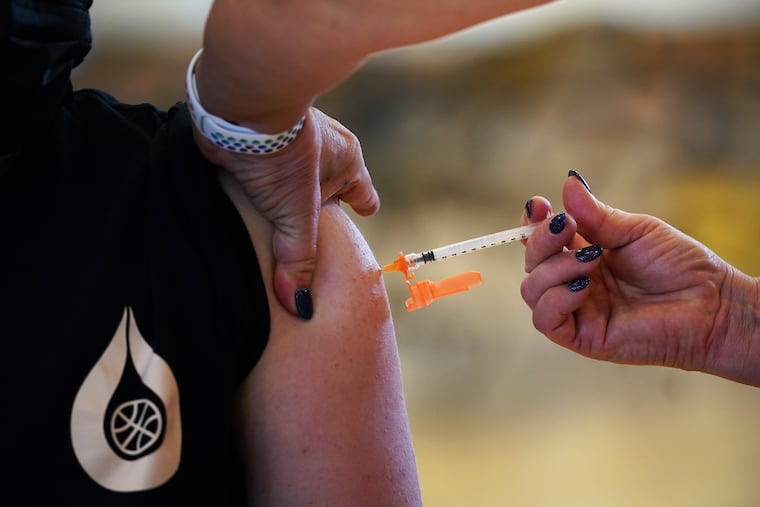Do you really need a COVID-19 booster shot? Experts disagree.
Debate over the timing and need for booster shots is growing.

Two weeks ago, the Biden administration’s plan to provide COVID-19 booster shots to fully vaccinated people beginning Sept. 20 sounded like a done deal.
But many scientists have since criticized the plan as unnecessary and unethical. And on Monday, the CDC’s independent vaccine advisory committee said the evidence on boosters for all is not yet clear.
Boosters of the Pfizer and Moderna vaccines must be approved by the Food and Drug Administration, and recommended by the CDC, so the apparent difference of opinions could delay, or even derail, the White House strategy.
The growing debate and uncertainty are raising many questions. Here are some answers:
I was fully vaccinated by March. Is my immunity waning?
President Joe Biden and his top health officials said boosters are needed about eight months after full vaccination because of evidence that vaccine-induced immunity wanes in that timeframe, plus the fact that the pandemic is again surging due to the highly transmissible delta variant.
Among the evidence they cited was a study from Israel, where nearly 80% of people over age 12 have received both doses of the Pfizer vaccine. The study, released in July, showed many Israelis who were among the first to be inoculated with the vaccine in January were getting “breakthrough” COVID-19 infections, while Israelis who had been vaccinated later were not getting reinfected as often. The inference was that protective antibodies generated by the vaccine had diminished in the early group.
» READ MORE: The wicked problem of booster shots for Americans | Expert Opinion
But as New York Times columnist David Leonhardt explained, a close look at the Israeli data reveals that the two groups were quite different, so their infection rates are open to interpretation — or misinterpretation.
“The first Israelis to have received the vaccine tended to be more affluent and educated,” he wrote. “By coincidence, these same groups later were among the first exposed to the delta variant, perhaps because they were more likely to travel. Their higher infection rate may have stemmed from the new risks they were taking, not any change in their vaccine protection.”
Another alarming but potentially misleading statistic from Israel: 60% of recently hospitalized patients were fully vaccinated. But as a Washington Post story explains, an unvaccinated Israeli is still about three times as likely to end up in the hospital as a vaccinated compatriot. And vaccinated people are older as a group than unvaccinated Israelis, so they are at higher risk of serious illness.
Is the delta variant evading the vaccines?
The delta variant has several mutations that make it better at breaking into cells and making copies of itself than earlier strains.
But numerous studies, including the Israeli analysis, have shown that even as delta has become dominant and led to breakthrough infections, vaccinated people have been protected against serious COVID-19. Almost all hospitalized patients in the United States are unvaccinated.
“COVID vaccines continue to maintain high protection against severe disease, hospitalization, and death,” CDC scientist Sara Oliver told the vaccine advisory panel Monday.
The panel has already endorsed giving an extra shot to people with weakened immune systems, such as cancer patients. Not only are they at risk of more severe disease, but many do not mount an adequate immune response with the standard vaccine regimen.
Data from a rigorously controlled trial and five studies that followed groups of patients suggest a third dose will stimulate an antibody response in about a third to a half of immunocompromised patients who don’t respond initially.
Why not give boosters to everyone, just in case?
One reason: It’s unfair.
The World Health Organization and other public health groups have denounced booster rollouts in affluent countries, mainly because many poor countries are in desperate need of first doses. Giving boosters now “is unfair to say the least, potentially … even criminal,” Tulio de Oliveira, a computational biologist at the University of KwaZulu-Natal, in Durban, South Africa, told Science magazine.
The unfairness is compounded by the fact that just over half the United States is fully vaccinated. Vaccine refusers contend that they have a right to choose, even though their choice endangers others, including children too young to get the shots. Population-wide vaccination is also the only hope for denying the virus the opportunity to keep spreading and mutating.
But ethical issues aside, it is not clear that boosters would prevent mild breakthrough infections unless they were modified to target the delta variant.
“We don’t know whether a non-delta booster would improve protection against delta,” Aaron Richterman, an infectious-disease fellow at the University of Pennsylvania, told columnist Leonhardt.
What happens next?
That, too, is hard to say.
On its website, the CDC says vaguely that the independent advisory committee “will continue to meet and discuss data” on vaccines and “will make further recommendations on the use of boosters for the public after a thorough review of the evidence.”
» READ MORE: Our best pandemic tips: Read our most useful stories about COVID-19